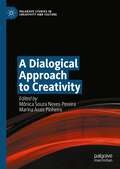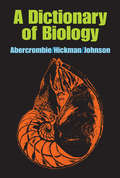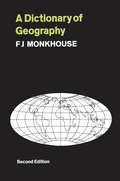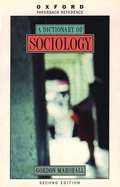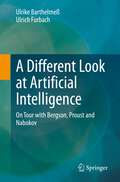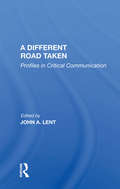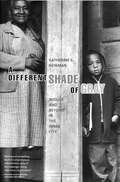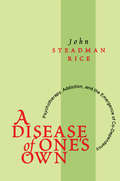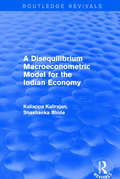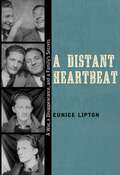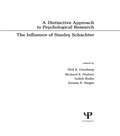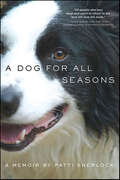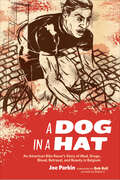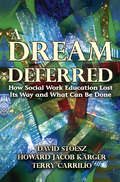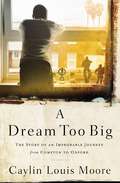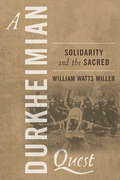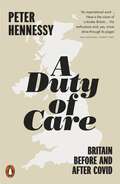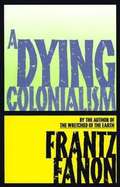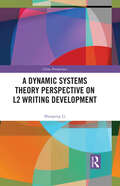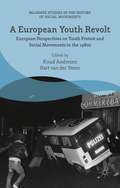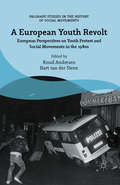- Table View
- List View
A Dialogical Approach to Creativity (Palgrave Studies in Creativity and Culture)
by Marina Assis Pinheiro Mônica Souza Neves-PereiraThis book takes an epistemological and theoretical stance in investigating the phenomenon of creativity and its processes. Creativity is analyzed through the lens of cultural psychology, in which psychological processes emerge over the course of life, and can only be understood in relation to the subject’s history and life experiences. Dialogism is presented as central for the constitutive dynamics of the developing subject and the emergence of creative actions through the expression of human agency. The authors highlight Bakhtinian dialogism and its developments in the scientific field of psychology and related areas to shed new light on creativity and its processes. The authors argue this will enable a better understanding of creativity in its development and emergence, and its impact on individuals and society.
A Dictionary of Biology
by M. Abercrombie C.J. Hickman M.L Johnson"A Dictionary of Biology" is an up-to-date reference work explains several thousand specialized words that allow for empirical approaches to the biological sciences. It includes more than bare definitions, including information about most of the things named so as to convey their significance in biological discussion. M. Abercrombie, C. J. Hickman, and M. L. Johnson in effect interpret this language as it is actually used, emphasizing customary usage rather than etymology.This comprehensive lexicon includes two thousand entries. Many unfamiliar terms, especially the rarer ones, are defined with the help of other technical terms, perhaps equally unfamiliar. This trick of dictionary-makers could only be avoided by giving a complete account of a large part of biology under each heading. Every biological technical term used in a definition is itself defined elsewhere in the dictionary; though some semi-technical terms, words that can be found in any English dictionary are omitted.The authors use codes throughout the dictionary to help the reader to interpret the use of a word such as whether it is used in relation to plants and animals only, whether the word is an adjective, and when a term is defined elsewhere and adds information to the current definition. The result is an invaluable guide for the layman, the student, and the scholar alike. It presents clear and authoritative explanations of the terms and will remain useful as a quick and concise source of reference.
A Dictionary of Criminal Justice
by Peter Joyce Neil WainA Dictionary of Criminal Justice is the only dictionary that deals with criminal justice from a UK perspective, and in doing so provides a comprehensive guide to all aspects of the British criminal justice system, including its historical context and contemporary operations. The first three sections of the book explore in turn key definitions, key pieces of legislation and key documents that have helped to shape the operations of the criminal justice system, whilst the fourth details websites of particular relevance to this field. As such, this dictionary provides an extensive but accessible introduction to the important terms that relate to both the development and the contemporary processes of criminal justice. It also succeeds in placing the UK criminal justice system within an international setting through the inclusion of entries that acknowledge the global setting in which British justice operates. Guides to key legislation and documents are included, and each definition is accompanied by references for further reading, making this book an invaluable learning tool for both students and practitioners of criminal justice.
A Dictionary of Geography
by F. J. MonkhouseThe geographer seeks to describe the diverse features of the earth's surface, to explain if possible how these features have come to be what they are, and to discuss how they influence the distribution of man with his diverse activities. Geography therefore stands transitionally yet centrally between the natural sciences, the social studies, and the humanities. While in its concept and content it is an integrated whole, of necessity it impinges on the associated disciplines, and inevitably makes use of a wide range of kindred terminology. In compiling the 3,400 entries for this dictionary, the main criterion for inclusion has been usage. Geographical textbooks and periodicals have been systematically combed, and where a term has been used in a specific geographical context, or in a specialist sense which differs from general practice or popular usage, it has been included. Foreign words are listed where they have been accepted into English geographical literature, especially where no satisfactory translation exists. Cross-references are freely given, printed in small capitals, where it is necessary to assist the user in tracing cognate and supplementary entries, or where the meaning of the word thus shown is essential to the understanding of the entry. The emphasis throughout is on specific factual information, conveniently accessible on a strict alphabetical basis, rather than a bare definition. Statistical material and formulae are appended, where it would seem helpful, in the form of tables under the relevant entries. Since this dictionary is neither a gazetteer nor a compendium of current affairs, lists of countries and capitals, regional names and international groupings are not included, since these can be found conveniently elsewhere. The five hundred and seventy-two additional entries to this dictionary, together with a few minor modifications to the existing material, are the result of extensive correspondence and discussion since the appearance of the firs
A Dictionary of Sociology
by Gordon MarshallThis is the most comprehensive and authoritative dictionary of sociology available in a single volume. Compiled by an expert team of sociologists under the editorship of Gordon Marshall, this new edition has been fully revised and updated. Ideal for those new to the subject, it will also be invaluable to more advanced students as well as teachers. Over 2500 entries Wide-ranging - includes major concepts from related disciplines; International coverage of terms, methods, and concepts; Biographical entries on major figures; Related terms from psychology, economics, anthropology, philosophy, and political science; Contains many substantial entries which are particularly helpful for students. The revision extends coverage of areas such as cultural studies and identity, mass media, nationalism, and developments in sociological research in the US. New entries include: administrative theory, broken window thesis, child abuse, consumer society, cultural studies, diaspora, Hans Eysenck, Goldthorpe Class Scheme, hooliganism, Internet, Japanization, McDonaldization, multi-level models, quality of life, reflexive modernization, sequence analysis,sustainable development, and victimology.
A Different Look at Artificial Intelligence: On Tour with Bergson, Proust and Nabokov
by Ulrich Furbach Ulrike BarthelmeßDigitalization is inexorably conquering our lives - also with artificial intelligence (AI) methods. Search engine operators, social network operators and shipping platform operators know more and more about us, about our buying and living habits. User data has become a valuable commodity. We live and work with computer systems that behave intelligently or are even intelligent. Questions like "Can machines be intelligent?" or "Can they have emotions or a consciousness?" keep popping up. To enable readers to form their own opinion on these questions, the authors clearly explain individual techniques or methods of AI and relate them to approaches from philosophy, art and neurobiology. Topics such as logical reasoning, knowledge and memory play just as important a role as machine learning and artificial neural networks. In the foreground is the question of what constitutes memory and thinking, what role our emotions play when we as humans move through life, through the world. A book that offers unusual perspectives on artificial intelligence.
A Different Road Taken: Profiles In Critical Communication
by John A LentDallas Smythe, George Gerbner, Herbert Schiller, James Halloran, Kaarle Nordenstreng- these five seminal figures form the backbone of current scholarship in critical communication. From policy research to television demographics and from economic globalization to cultural imperialism, their insights and discoveries have given both scholars and the
A Different Shade Of Gray: Midlife And Beyond In The Inner City
by Katherine S. NewmanCombining details about specific people with analysis of the trends that have shaped their lives, this book exposes the aging urban underclass. It focuses on the lives of the elderly African Americans and Latinos in pockets of New York City, where wages are low, and crime is often high.
A Discourse on Inequality
by Jean-Jacques Rousseau Maurice CranstonRousseau contends that primitive man is equal to his fellows because he can be independent of them, but as societies become more sophisticated, the strongest and most intelligent members of the community gain an unnatural advantage over their weaker brethren, and the constitutions set up to rectify these imbalances through peace and justice in fact do nothing but perpetuate them.
A Disease of One's Own: Psychotherapy, Addiction and the Emergence of Co-dependency
by John Steadman RiceIn the present decade, "co-dependency" has sprung up on the landscape of American popular culture. Portrayed as an addiction-like disease responsible for a wide range of personal and social problems, co-dependency spawned a veritable social movement nationwide. 'A Disease of One's Own' examines the phenomenon of co-dependency from a sociological perspective, viewing it not as something a person "has," but as something a person believes; not as a psychological disease, but as a belief system that offers its adherents a particular way of talking about the self and social relationships. The central question addressed by the book is: Why did co-dependency--one among a plethora of already-existing discourses on self-help--meet with such widespread public appeal? Grounded in theories of cultural and social change, John Steadman Rice argues that this question can only be adequately addressed by examining the social, cultural, and historical context in which co-dependency was created and found a receptive public; the content of the ideas it espoused; and the practical uses to which co-dependency's adherents could apply those ideas in their everyday lives. In terms of the larger American context, his analysis links the emergence of co-dependency with the permeation of psychological concepts and explanations throughout Western culture over the past thirty years, focusing particularly on the cultural and social impact of the popular acceptance of what the author calls "liberation psychotherapy." Liberation psychotherapy portrays the relationship between self and society as one of intrinsic antagonism, and argues that psychological health is inversely related to the self's accommodation to social expectations. Rice argues that a principal source of co-dependency's appeal is that it affirms core premises of liberation psychotherapy, thereby espousing an increasingly conventional and familiar wisdom. It simultaneously fuses those premises with addiction-related discourse, providing people with a means of making sense of the problems of relationship and identity that have accompanied what Rice terms the "psychologization" of American life. This brilliant analysis of the phenomenon of co-dependency will be of interest to psychologists, sociologists, psychotherapists, and those interested in American popular culture.
A Disequilibrium Macroeconometric Model for the Indian Economy
by Kaliappa Kalirajan Shashanka BhideThis title was first published in 2003. This text presents a new approach to incorporating regional details on production in a disequilibrium macroeconometric model. The early studies on disequilibrium dealt with either partial-adjustment models or models involving excess demand or supplies in markets. In this study the authors consider a different type of disequilibrium model - one in which econometric analysis makes use of the varying coefficients stochastic production frontier approach, which permits estimation and analysis of production efficiencies of individual producers. The book also presents an innovative approach to production modelling in macro econometric models as it provides a useful framework for incorporating production efficiencies and regional details of production in the macro models. It is a pioneering study that combines the stochastic frontier approach with macro econometric modelling. Primarily focused on India, it also provides insights into problems in modelling economies of other developing countries.
A Distant Heartbeat: A War, a Disappearance, and a Family's Secrets
by Eunice LiptonOn May 20, 1938, a young man from the Bronx informs his parents that he is leaving for the Catskills to begin his new job as a waiter. Instead, he sails for Europe to join the Abraham Lincoln Brigade in the Spanish Civil War, the opening round in the fight against Hitler and Mussolini. The man, Dave Lipton—the author&’s uncle—sends letter after letter home detailing his hopes and begging for forgiveness. He never receives a reply.Decades later, Eunice Lipton stumbles upon clues for this silence, uncovering details of Dave&’s exhilarating political life in New York, his shuttered romantic life, and his deep friendship with another volunteer. A Distant Heartbeat tells a tale of passion and heroism, centered on a fierce competition between brothers, a packet of missing letters, and the unforeseen results of family betrayal.
A Distinctive Approach To Psychological Research: The Influence of Stanley Schachter
by Richard E. Nisbett Judith Rodin Neil E. Grunberg Jerome E. SingerFirst published in 1987. Routledge is an imprint of Taylor & Francis, an informa company.
A Dog for All Seasons: A Memoir
by Patti Sherlock“A moving memoir of a loving relationship with a dog and the trials and tribulations of living on a western sheep farm.” —Temple Grandin, New York Times–bestselling authorPatti Sherlock's working relationship with her Border Collie, Duncan, got her through the ups and downs of sixteen years on a sheep farm in Idaho. During that time, Duncan was an unwavering companion through the destruction of Patti's marriage, her children inevitably leaving home one by one, and eventually, her decision to stop raising sheep. Patti's life on the farm is a reflection of beginnings and endings, and the cycle of seasons in all of our lives.“If you've forgotten how to see miracles in everyday moments, this book will remind you. It's a story about the real world, the world where human beings live in constant contact with nature, and where animals are more than best friends.” —W. Michael Gear and Kathleen O'Neal Gear, New York Times–bestselling authors“A Dog for All Seasons gives us the convergence of a remarkable woman, a wonderful dog, and a fascinating way of life. It's the literary equivalent of fresh air, pure water, and sparkling sunlight. The book should be savored.” —Tim Sandlin, author of Skipped Parts“Tender, wise, and deeply affecting, Sherlock's vignettes will make readers smile and sigh and wish for their own Duncan.” —Publishers Weekly
A Dog in a Hat: An American Bike Racer's Story of Mud, Drugs, Blood, Betrayal, and Beauty in Belgium
by Joe ParkinIn 1987, Joe Parkin was an amateur bike racer in California when he ran into Bob Roll, a pro on the powerhouse Team 7-Eleven. "Lobotomy Bob" told Parkin that, to become a pro, he must go to Belgium. Riding along a canal in Belgium years later, Roll encountered Parkin, who he saw as "a wraith, an avenging angel of misery, a twelve-toothed assassin". Roll barely recognized him. Belgium had forged Parkin into a pro bike racer, and changed him forever. A Dog in a Hat is Joe's remarkable story. Leaving California with a bag of clothes, two spare wheels, some cash, and a phone number, Parkin left the comforts of home for the windy, rainswept heartland of European cycling. As one of the first American pros in Europe, Parkin was what the Belgians call "a dog with a hat on" -- something familiar, yet decidedly out of place. Parkin lays out the hard reality of the life--the drugs, the payoffs, the betrayals by teammates, the battles with team owners for contracts and money, the endless promises that keep you going, the agony of racing day after day, and the glory of a good day in the saddle. A Dog in a Hat is the unforgettable story of the un-ordinary education of Joe Parkin and his love affair with racing, set in the hardest place in the world to be a bike racer. It is a story untold until now, and one that you will never forget.
A Double Burden: Israeli Jews in Contemporary Germany (SUNY series in National Identities)
by Uzi Rebhun Heinz Sünker Dani KranzCritically analyzing Israeli-Jewish migration to Germany, A Double Burden combines complementary approaches from the social sciences—quantitative, qualitative, and ethnographic research—to track migrants' reasons for moving, their families' reactions, their settlement in the new country, and their social and economic integration, construction of identity, and perceptions of old and new antisemitism in Germany. Each chapter is placed within a relevant theoretical framework, the entire discussion set against the background of present-day international migration in general, migration to Germany in particular, and the Jewish experience in unified Germany. Rich with empirical evidence and presented with exceptional clarity and accessibility, A Double Burden will appeal to scholars of migration studies, the Israeli Diaspora, and German-Jewish life, as it also illuminates trauma and memory among third-generation Holocaust survivors.
A Dream Deferred: How Social Work Education Lost Its Way and What Can be Done
by Howard KargerFrom its inception in the late nineteenth century, social work has struggled to carry out the complex, sometimes contradictory, functions associated with reducing suffering, enhancing social order, and social reform. Since then, social programs like the implementation of welfare and the expansion of the service economy-which should have augured well for American social work-instead led to a continued loss of credibility with the public and within the academy.A Dream Deferred chronicles this decline of social work, attributing it to the poor quality of professional education during the past half-century. The incongruity between social work's promise and its performance warrants a critical review of professional education. For the past half-century, the fortunes of social work have been controlled by the Council of Social Work Education, which oversees accreditation of the nation's schools of social work. Stoesz, Karger, and Carrilio argue that the lack of scholarship of the Board of Directors compromises this accreditation policy. Similarly, the quality of professional literature suffers from the weak scholarship of editors and referees. The caliber of deans and directors of social work educational programs is low and graduate students are ill-prepared to commence studies in social work. Further complicating this debate, the substitution of ideology for academic rigor makes social work vulnerable to its critics.The authors state that, since CSWE is unlikely to reform social work education, schools of social work should be free to obtain accreditation independently, and they propose criteria for independent accreditation. A Dream Deferred builds on the past, presents a bracing critique of the present, and proposes recommendations for a better future that cannot be ignored or dismissed.
A Dream Too Big: The Story of an Improbable Journey from Compton to Oxford
by Caylin Louis MooreIn this inspiring and provocative memoir, Caylin Moore tells the against-all-odds story of his rise from cruel poverty in gang-ridden Los Angeles to academic success at Oxford University, with hope as his compass.By all rights, Caylin Louis Moore should be dead, in prison, or stalking the streets of Compton with his fellow gang-members. Instead, he’s a Rhodes Scholar, author, speaker, and role model for every kid deprived of hope in downtrodden communities. A Dream Too Big is the story of Moore’s exodus from one of the most impoverished, gang-infested communities in the United States to the golden, dreaming spires of Oxford, England.After Moore’s mother gathered her three young children and fled an abusive husband of nine years, leaving behind a comfortable middle-class life, Moore found himself in a bewildering and dangerous environment. The family lived in a neighborhood ruled by the Bloods, and Caylin often lay awake at night, terrified by both the sounds of gunfire outside and the scratching of rats and roaches moving in the walls. When Moore’s father was convicted of murder and his mother was sexually assaulted in the hospital while recovering from open-heart surgery, Moore was forced to enter adulthood prematurely. Embracing his mother’s steely faith in God and education, Moore skirted the gangs and the endemic violence of Compton to excel on the football field and in the classroom.Academics and athletics led to college scholarships, which led to a Fulbright and eventually the Rhodes Scholarship. Along the way, Moore cofounded a student organization that brought college athletes into underserved classrooms as inspirational speakers, role models, and mentors. Moore’s eye-opening, inspirational story proves that, contrary to what others told him on his journey, there is no such thing as a dream too big. "A dream too big is a truly special book. Caylin's story is not just inspirational, it is instructional. I have admired him and his journey for a long time; read this book and you'll understand why." --Wes Moore, bestselling author of The Other Wes Moore, CEO of Robin Hood "I loved this story of triumph in praise of a sacrificial single mom and a kid who, against all odds, fought hunger-pains and gangs to make a dream-too-big become a dream-come-true. Through gunshots and the temptations of inner city poverty, Caylin Moore laced up his cleats, outran gangs, and caught the 6:00am bus on an empty stomach. A future world-changer, Caylin has penned an inspiring tale that should be mandatory reading for every student, parent, and anyone else interested in the success of those who will shape and define our future." -- Ron Hall, #1 New York Times bestselling author of Same Kind of Different as Me and Workin' Our Way Home
A Durkheimian Quest
by William Watts MillerDurkheim, in his very role as a 'founding father' of a new social science, sociology, has become like a figure in an old religious painting, enshrouded in myth and encrusted in layers of thick, impenetrable varnish. This book undertakes detailed, up-to-date investigations of Durkheim's work in an effort to restore its freshness and reveal it as originally created. These investigations explore his particular ideas, within an overall narrative of his initial problematic search for solidarity, how it became a quest for the sacred and how, at the end of his life, he embarked on a project for a new great work on ethics. A theme running through this is his concern with a modern world in crisis and his hope in social and moral reform. Accordingly, the book concludes with a set of essays on modern times and on a crisis that Durkheim thought would pass but which now seems here to stay.
A Duty of Care: Britain Before and After Covid
by Peter HennessyOne of our most celebrated historians shows how we can use the lessons of the past to build a new post-covid society in BritainThe 'duty of care' which the state owes to its citizens is a phrase much used, but what has it actually meant in Britain historically? And what should it mean in the future, once the immediate Covid crisis has passed?In A Duty of Care, Peter Hennessy divides post-war British history into BC (before covid) and AC (after covid). He looks back to Sir William Beveridge's classic identification of the 'five giants' against which society had to battle - want, disease, ignorance, squalor and idleness - and laid the foundations for the modern welfare state in his wartime report. He examines the steady assault on the giants by successive post-war governments and asks what the comparable giants are now. He lays out the 'road to 2045' with 'a new Beveridge' to build a consensus for post-covid Britain with the ambition and on the scale that was achieved by the first.
A Dying Colonialism
by Frantz Fanon Haakon ChevalierPsychiatrist, humanist, revolutionary, Frantz Fanon was one of the great political analysts of our time, the author of such seminal works of modern revolutionary theory as The Wretched of the Earth and Black Skin, White Masks. He has had a profound impact on civil rights, anticolonialism, and black consciousness movements around the world. <p><p> A Dying Colonialism is Fanon's incisive and illuminating account of how, during the Algerian Revolution, the people of Algeria changed centuries-old cultural patterns and embraced certain ancient cultural practices long derided by their colonialist oppressors as "primitive," in order to destroy those oppressors. Fanon uses the fifth year of the Algerian Revolution as a point of departure for an explication of the inevitable dynamics of colonial oppression. This is a strong, lucid, and militant book; to read it is to understand why Fanon says that for the colonized, "having a gun is the only chance you still have of giving a meaning to your death."
A Dynamic Systems Theory Perspective on L2 Writing Development (China Perspectives)
by Shaopeng LiFrom the perspective of empirical complex dynamic systems, this book investigates the complex and nonlinear process of L2 writing centering on three linguistic aspects of L2 writing development: vocabulary, syntax, and discourse.Combining dynamic systems theory, variation analysis, as well as data and cases studies from Chinese EFL learners’ writing, the book critically engages with the heated discussion on dynamic patterns of L2 writing development that focus heavily on the linguistic dimensions of complexity, accuracy, and fluency. The author expands the scope of the research by integrating both linguistic and functional dimensions of L2 output and examines the interaction and co-development of these dimensions. This framework helps delineate a full picture of individual learners’ L2 writing dynamic patterns across all components of their communicative repertoire. The research findings suggest the developmental path of writing system for each EFL learner may differ, which is influenced by their different learning characteristics and learning environments in China.The title will appeal to scholars interested in applied linguistics and second language acquisition. Suggestions on pedagogy and language learning advanced in the book will also make it a useful read for L2 language learner and TESOL and TEFL teachers.
A European Social Union after the Crisis
by Frank Vandenbroucke Catherine Barnard De Baere GeertToday, many people agree that the EU lacks solidarity and needs a social dimension. This debate is not new, but until now the notion of a 'social Europe' remained vague and elusive. To make progress, we need a coherent conception of the reasons behind, and the agenda for, not a 'social Europe', but a new idea: a European Social Union. We must motivate, define, and demarcate an appropriate notion of European solidarity. We must also understand the legal and political obstacles, and how these can be tacked. In short, we need unequivocal answers to questions of why, what, and how: on that basis, we can define a clear-cut normative and institutional concept. That is the remit of this book: it provides an in-depth interdisciplinary examination of the rationale and the feasibility of a European Social Union. Outstanding scholars and top-level practitioners reflect on obstacles and solutions, from an economic, social, philosophical, legal, and political perspective.
A European Youth Revolt: European Perspectives on Youth Protest and Social Movements in the 1980s (Palgrave Studies in the History of Social Movements)
by Knud Andresen Bart van der SteenA European Youth Revolt.
A European Youth Revolt: European Perspectives on Youth Protest and Social Movements in the 1980s (Palgrave Studies in the History of Social Movements)
by Bart van der SteenDuring the early 1980s, large parts of Europe were swept with riots and youth revolts. Radicalised young people occupied buildings and clashed with the police in cities such as Zurich, Berlin and Amsterdam, while in Great Britain and France, 'migrant' youths protested fiercely against their underprivileged position and police brutality. Was there a link between the youth revolts in different European cities, and if so, how were they connected and how did they influence each other? These questions are central in this volume. This book covers case studies from countries in both Eastern and Western Europe and focuses not only on political movements such as squatting, but also on political subcultures such as punk, as well as the interaction between them. In doing so, it is the first historical collection with a transnational and interdisciplinary perspective on youth, youth revolts and social movements in the 1980s.
